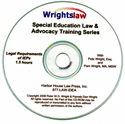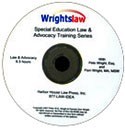We often allow children with a neurobehavioral disability like ADHD or specific learning disabilities to misbehave and get away with bad behavior because we believe they cannot control their behavior. This is not true!
Because a child has disabilities, we often lower our expectations. If we do not expect them to control their behavior and their impulses, they won't.
Pete said "When I was raising my children, many people said I was too hard on them."
What do you think? Was he? How did they turn out?
At the end of this article, you'll find a progress report on how his boys are doing today. But first, read Pete's Four Rules.
#1. The child had to work
Children need to learn that their work contributes to the welfare of the family.
When a child was young and we went to the store, the child had to carry a bag or two into the house. When they were a little older, they didn't ask - they just picked up bags and helped.
When they grew tall enough to reach the sink, they had to help wash the dishes.
When they were teenagers, they had to earn their spending money. They cut grass, did odd jobs in the neighborhood, delivered pizza, you name it.
#2. No Telephone or Television in the Child's Room, Ever!
In addition to a bed, each child's room had a desk, bookcases, and lots of books.
#3. The Child Had to Learn to Touch-Type at Home
Each child learned to touch-type at home. We used a typing software program like Mavis Beacon for 15-30 minutes a day. It took about three months for the child to learn to type 30 words per minute. This is an excellent activity for the summer.
Use a chart to graph the child's progress in typing. Charts make progress real.
When the child reached intermediate goals, they received small rewards. After they could type 30 wpm consistently, typing lessons ended. Eight years of age is not too young to start. Do not expect that the child will learn to touch type at school. Schools are not consistent. Teach this skill at home.
#4. Never ask"WHY?"
When my children misbehaved or messed up, I never asked them "WHY did you . . . ?"
Why did you come home an hour late? Why did you come home with alcohol on your breath? Why didn't you clean up your room? Why did you leave a mess in the kitchen? Why didn't you finish your homework? Why did you finger-paint on the walls?
When the parent asks a child WHY?, the child learns to create good excuses, shifts blame onto others, views himself or herself as a "victim of circumstances" -- and not does not learn to take responsibility for his or her behavior.
Talking about WHY the child misbehaved will not teach the child that he has control over himself, his environment and his future. This will not teach him to take responsibility for his actions. When you ask "Why," it's easy to slip in some guilt - "Why did you do this? You upset me so much. You made me feel terrible."
Stay away from guilt.
Before my first child was born, I worked in juvenile training schools. I read a book called Reality Therapy by psychologist William Glasser.
Dr. Glasser wrote:
"Eliminate the word 'why' from your vocabulary in dealing with child behavior. So often, children don't know 'why.' They acted because 'I felt like doing it' and they don't really know why. You should never ask 'Why?'
Ask these four questions instead:
- What did you do?
- What are you going to do about it?
- To ensure that this does not happen again, what should we do to you now?
- If this does happen again, despite your good intentions now, how much more severe shall the punishment be next time?
Read more about Dr. Glasser and how this book changed the way Pete dealt with the kids he worked with.
You'll also find out how it changed the way Pete viewed his job as a parent and the influence it had on his children.
Read the article Training Lions and Tigers: Discipline and Children with Disabilities. Don't miss the update on Pete's two boys. |









